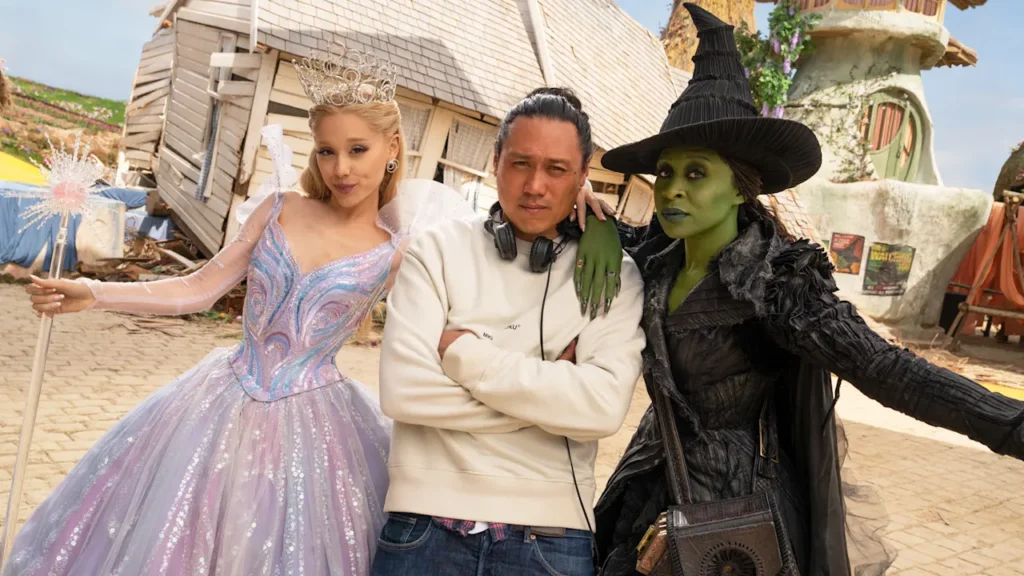
Before Wicked opened on Broadway in October 2003, the musical’s production team took the show to the Curran Theatre in San Francisco for what’s called an “out of town tryout.” The five-week run allowed the producers, writers, and director to work out the kinks ahead of the show’s Broadway debut.
During the San Francisco run, University of Southern California film student Jon M. Chu happened to be home for the weekend visiting his parents, who owned a Chinese restaurant called Chef Chu’s in Los Altos, California, just outside Silicon Valley. Chu was the youngest of five children growing up in a family that spent their free time playing instruments or going to the ballet, the opera, musicals, and the movies. “It was the time of Michael Jordan on TV, and Steven Spielberg movies,” Chu recalls. “Michael Jackson videos were like mini musicals.”
Chu was raised on what he calls “this beautiful idea of story,” and went to film school with an inner theater geek driving his desire to learn the craft. So it wasn’t a surprise when his mom, Ruth, suggested they catch the show at the Curran.
Also at the show was Marc Platt, Wicked’s producer, who spent those five weeks in San Francisco putting the finishing touches on what would eventually become one of Broadway’s biggest hits.
Little did either of these men know that nearly 20 years later they’d pair up to bring Wicked to the big screen. “I waited 20 some years to make the movie after I produced the stage show,” Platt says. “There were many reasons I waited; destiny was calling me to wait until Jon was available.”
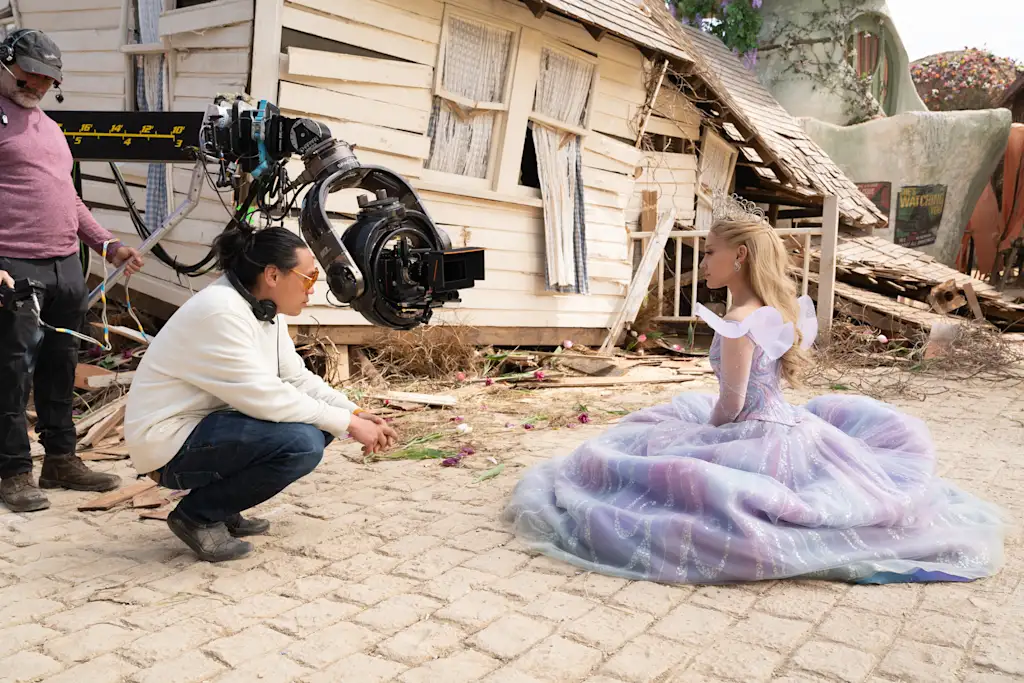
Their partnership is now one of Hollywood’s great success stories. Together, Chu and Platt delivered a giant blockbuster that grossed $114 million in box-office sales on its opening weekend in November 2024 (it went on to gross nearly $750 million). Now they’re poised to do it again with the release of part two, Wicked: For Good.
The Wicked films represent a big gamble for Universal Pictures—two lavish movie musicals released back-to-back with an estimated combined budget of roughly $300 million. All this in an era when studios are cutting costs and audiences are distracted by content that requires them to do nothing more than scroll their phones or stream TV from the living room couch.
Still, Chu says he’s more optimistic about filmmaking than ever. Now is the moment, he says, to fight for big stories that can break through in a business that’s increasingly driven by algorithms and a focus on the bottom line.
“I think if you want to fight that fight, you’ve got to play by the rules of this game,” he says. “You have to entertain the hell out of people.”
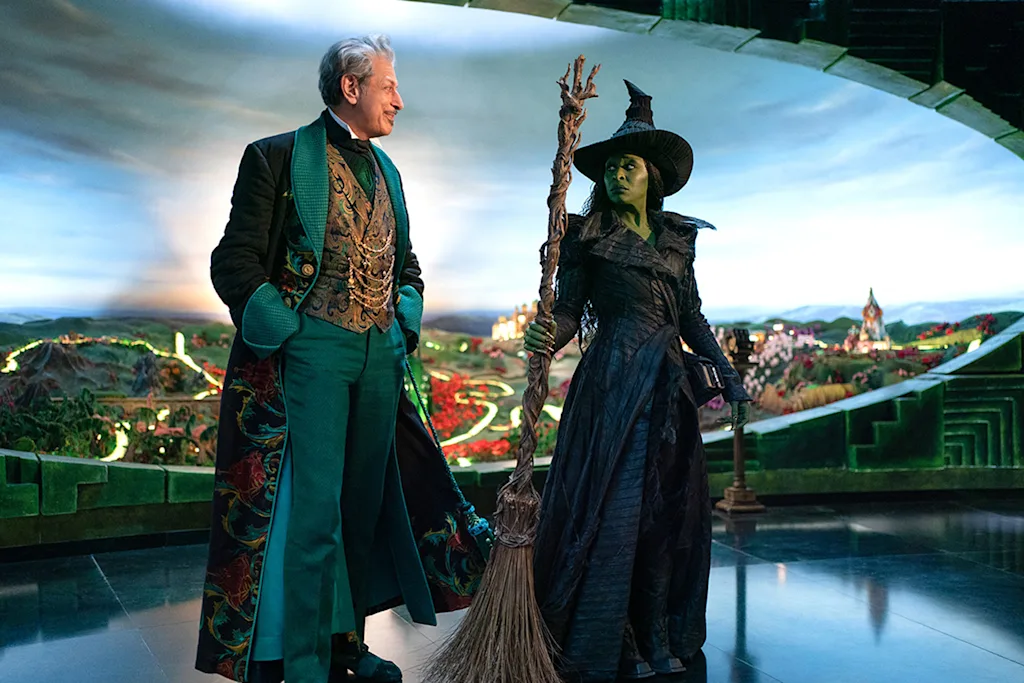
The Silicon Valley Showman meets the Hollywood Machine
Chu grew up inside two great American experiments—the immigrant dream and Silicon Valley innovation. His parents have run Chef Chu’s for decades. In fact, that’s where he was gifted his first camera and editing software from some thoughtful customers who worked in the movie industry.
In high school Chu convinced his teachers to allow him to turn in short edited videos rather than written papers, which provided him the opportunity to develop a fluency with the software he’d inherited at the restaurant. He also landed gigs shooting weddings and bar mitzvahs in his hometown. He was an early adopter from adolescence, learning how to master After Effects and Pro Tools.
In 2002, while at USC, Chu gained some notoriety for a short film called When the Kids Are Away, which he made with a grant from the Princess Grace Foundation. It was a full-blown movie musical with singing and dancing, all about how stay-at-home-mothers spend their time when children are in school and spouses are at work. To work on it with him, he pulled in film school classmate and budding cinematographer Alice Brooks. They would later reunite on the Wicked films.
Chu had an early run of films that cemented his approach to musical storytelling. In his first studio film, 2008’s Step Up 2 the Streets, Chu learned how to turn ideas into an actual production by marrying choreography and character. Then, as director of Justin Bieber: Never Say Never, Chu gained an understanding of how powerful internet culture can be as a storytelling mechanism. It wasn’t until he directed Crazy Rich Asians, though, that Chu truly turned a corner in his career. The film allowed him to blend cultural nuance, authentic storytelling, and mass appeal. All of this leveled up into Wicked, which is Chu’s most ambitious film by far.
The movie required him to stretch beyond his creative instincts. Donna Langley, chairperson of Universal Pictures, says Chu is as much a whip-smart executive as he is a creative: “He thrives at the intersection of commerce and art. He is deeply empathetic, pragmatic, and innovative. He sees challenges as opportunities, is extremely methodical in his planning, and yet remains flexible in his execution.”
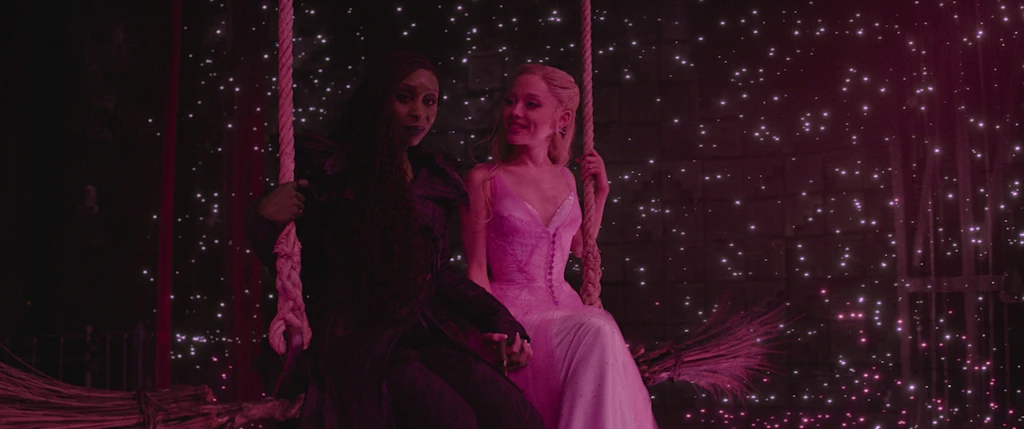
Storytelling as empathy
Chu sees storytelling as a kind of transcendent currency in the current age of filmmaking. “It is one of the most powerful empathy engines we have other than travel,” he says. It helps, of course, that with Wicked Chu happens to be telling a uniquely magical story, in a land that feels so fantastical and vibrant you cannot help but be transported.
But Chu’s singular power in bringing Wicked to life is his ability to think like a storyteller and work like an engineer. Chu’s creative system is deliberate and disciplined. He recalls how in his early years of editing, he devised a system for nonlinear storytelling logic that helped him organize his ideas. He would assemble thousands of screenshots, textures, and notes and organize them into folders. These folders became a “creative pantry” of sorts that he began drawing from when developing a new film.
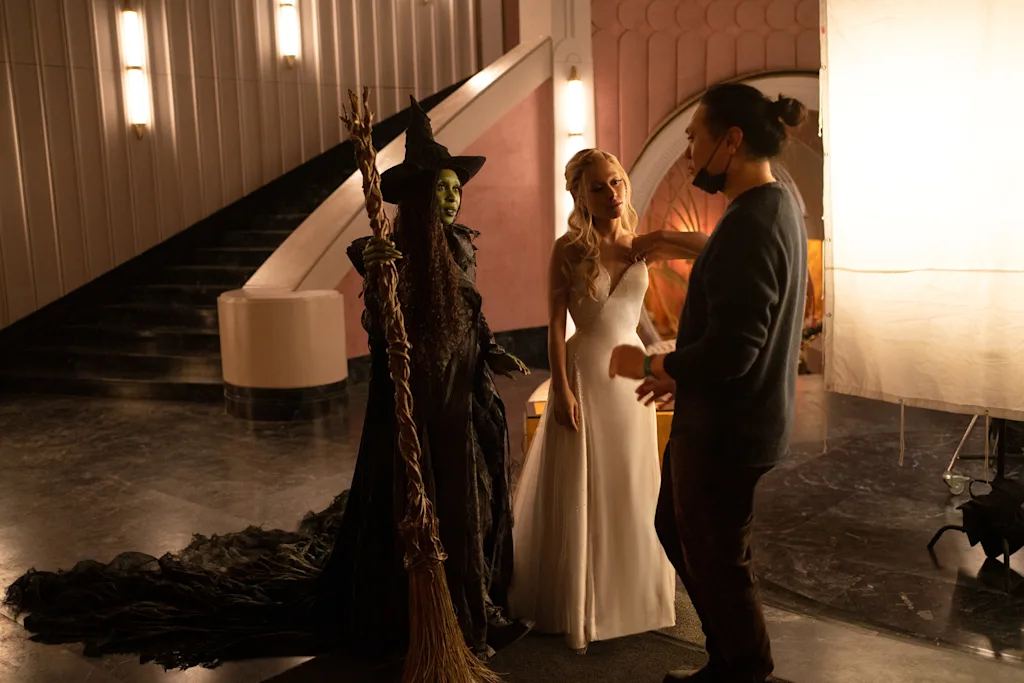
When Chu and cinematographer Brooks were classmates at USC they bonded over their love of musicals. “I think both of us are really emotional storytellers,” says Brooks, who worked with Chu on both In the Heights and Wicked (among others). “It’s about breaking a story from the inside out.” She describes Chu’s process as incredibly intentional.
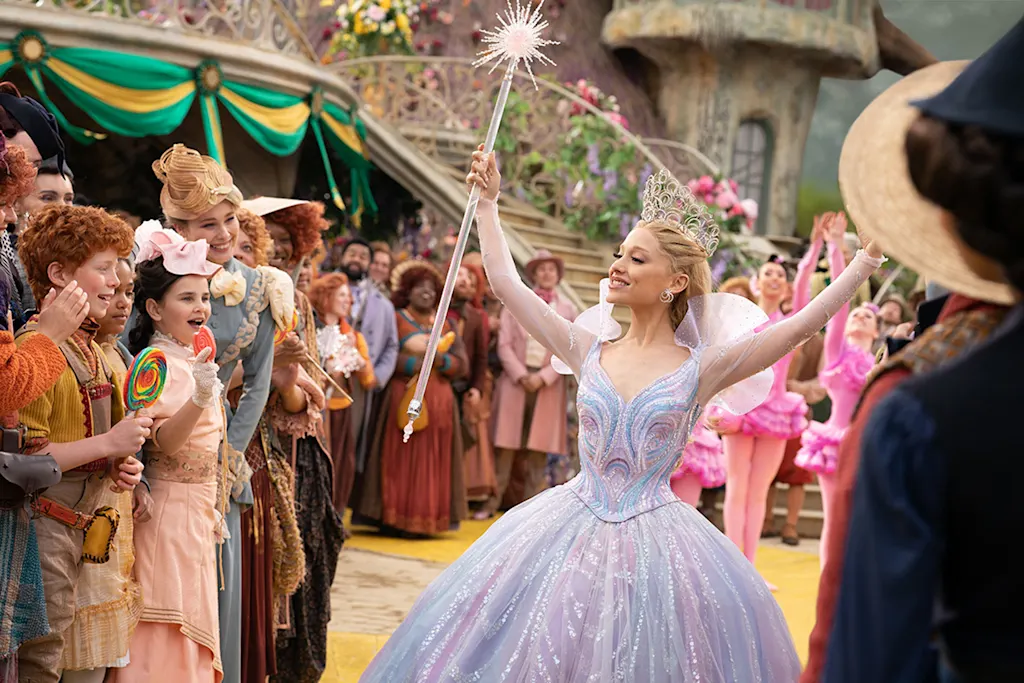
She and Chu move at their own pace during the early stages of production and planning, trusting one another’s instincts as they go. “When we first get a script, we break down each scene with one word, emotional intention, and every single camera choice and lighting choice comes from those intentions,” Brooks says. “It’s a long marinating process of letting ideas grow first, and then the technical ideas come very much as a secondary.”
On the set of Wicked: For Good, Chu implemented a process that required the actors to speak their lines while rolling before official filming began. While rehearsing the song “For Good,” actors Ariana Grande and Cynthia Erivo began to ad lib, singing to one another through a closet door. It was totally unplanned, but also part of Chu’s usual process ahead of a scene, so he let it go and the captured moment ended up one of the most memorable in the film.
“Process is how genius happens,” he says.
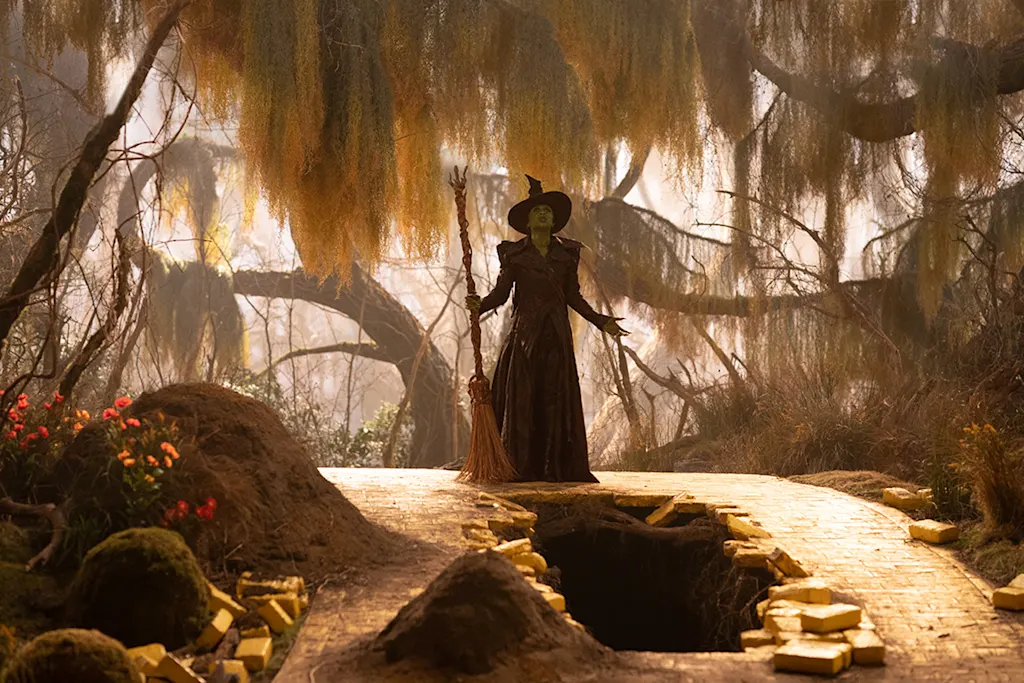
During the development of a movie, Chu doesn’t think about box-office sales. Instead, he’s locked in on making sure the film is as entertaining as possible. He views movies as a portal into another world, where the audience can experience things from someone else’s perspective. “To me, that is what we need to protect most in our culture,” Chu says. “I feel great responsibility that I have a microphone to be in that space.”
Chu began shooting both Wicked films in 2022 before AI really became a thing. He and the movie’s team of more than 700 visual effects experts were deeply focused on building a tactile but imperfect world. He wanted tables that wobbled and doors with cracks in them. For Wicked to work, nothing could feel overly manufactured or make believe.
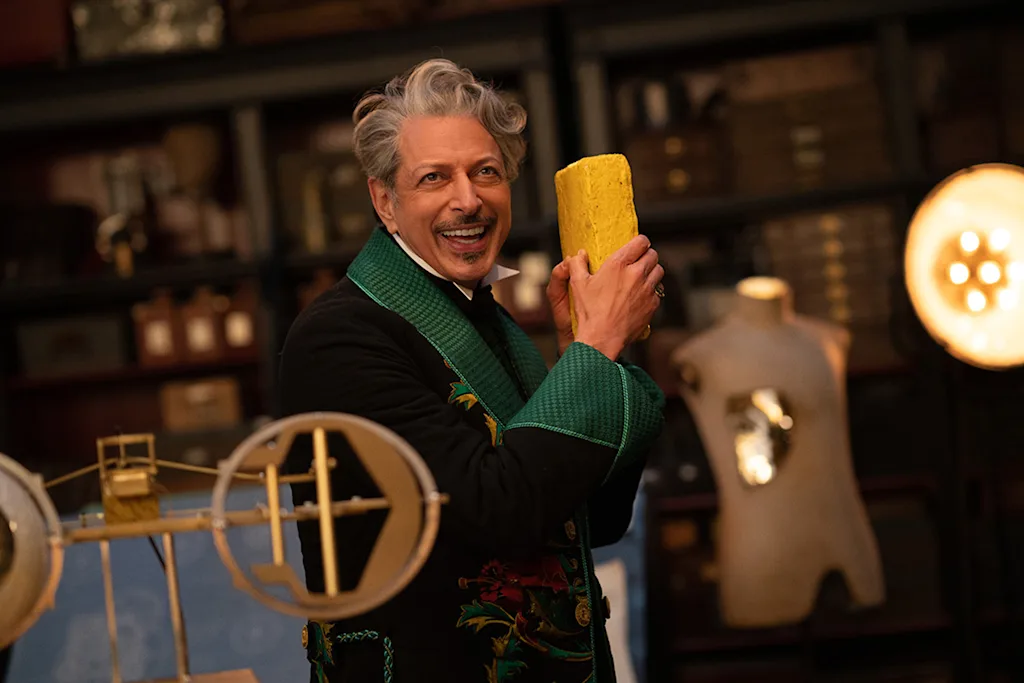
“He insisted the world be touchable, that we could feel the scratches and dirt,” says Platt. That quality is what allows the audience to feel the high stakes in Glinda and Elphaba’s relationship, Chu says, noting that everything on set within 40 feet was physically built. The imperfections enabled a kind of intimacy with the audience that AI could never replicate. “This couldn’t feel like a dream, because we were talking about real things and we’re digging at real truth,” he says.
Platt says this unwavering commitment to emotional resonance is what makes Chu unique at this moment in time. “Even when it was challenging to make changes, or we had disagreements with the writers, there was always joy in the process,” Platt says. “When your director feels that way, it permeates all those working on a production. But also it made me confident in our collaboration, and in the outcome.”
In many ways, Chu represents a blueprint for what the movie business will need as technology continues to infuse cinema. Chu believes that as AI becomes a bigger part of how creatives make their work, it will only put more value on human curiosity. “In the end,” he says, “it’s about building something people can feel—even in a world made of pixels.”


